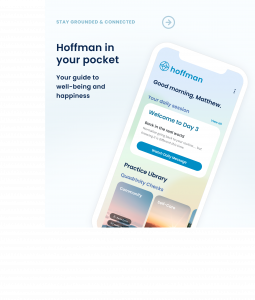 Award-winning storyteller in television, film, and literature, Matthew Weiner, is a recent graduate of the Hoffman Process.
Award-winning storyteller in television, film, and literature, Matthew Weiner, is a recent graduate of the Hoffman Process.
Matthew is the creator, executive producer, writer, and director of the television show, Mad Men. Matthew shares that his biggest fear in doing the Process was losing his creativity; if he healed his trauma, he’d no longer be creative. Now on the other side of the Process, Matthew knows his fear was unfounded because, through his deep work of transformation, he learned that making art is part of healing trauma.
As a comedy writer, Matthew shares that often negative self-statements get a laugh. And yet, that inner negativity, including when it is pointed at ourselves, is, as Matthew says, “not sustainable.” Releasing harmful negative patterns and the negative love we learned as children brings freedom and a lightness that is hard to imagine until you discover it within yourself.
A particularly beautiful and wise reflection from Matthew comes when he speaks about childhood. He shares that, as children, we see ourselves as a “supporting player” in our parents’ lives, not realizing that each of us is actually “the star” of our childhood.
Toward the end, Matthew shares the importance of reflecting on his experience during the Process and after. Post-Process, people have told him he’s different, his voice has changed and he’s softer. Like many of our guests, Matthew sees value in this process of reflection through conversation on personal transformation. We know there is also great value in witnessing another’s experience. We hope you enjoy this wise, reflective conversation with Matthew and Drew.
Matthew Weiner is a nine-time Emmy Award winner and five-time WGA Award-winning storyteller in television, film, and literature. Among his range of credits are two of television’s most successful and critically lauded shows: creator, executive producer, writer, and director on Mad Men, which was distinguished with the Peabody Award, and executive producer for The Sopranos. Weiner was also the creator, executive producer, writer, and director of the original contemporary anthology series, The Romanoffs, set in seven countries around the globe.
Weiner’s debut novel, Heather, The Totality, was published by Little, Brown and Company. You can discover more about Matthew Weiner here.
Podcast: Download (Duration: 54:35 — 50.0MB)
Subscribe: RSS
Quote:
“Unfortunately, or maybe fortunately, I don’t have anything on paper despite years of constant rejection. In showbiz, all bad news has come through agents and in the form of phone calls. Even early on. I don’t know that I would have saved them if I had gotten them. They’re like bad reviews for me, best skimmed through and then briefly obsessed over before being mentally discarded. I’ve come to realize rejection is now part of my process. I am not used to it by any means, nor do I expect it, but it both sharpens my resolve that my ideas are new and also drives me to professionally outlive the resistance of the gatekeepers. If I wait patiently they will either move on, reconsider, or become brave enough to try something new. Rejection, as painful as it is, is nothing more than a delay.“ – Matthew Weiner
Mindful Self-Compassion (Kristin Neff and Chris Germer)
Listen to Kristen Neff on the Hoffman Podcast.
Listen to Chris Germer on the Hoffman Podcast,
Livia Soprano
David Chase
Terry (Terrence) Winter
Robin Green
Mitch (Mitchell) Burgess
TM (Transcendental Meditation)
About the song, Try a Little Tenderness
Try a Little Tenderness by Otis Redding
Hoffman Teacher, Barbara Comstock
Listen to Barbara Comstock on the Hoffman Podcast
The cargo ship that took down Baltimore’s Francis Scott Key Bridge
Sigmund Freud
Id: the part of the mind in which innate instinctive impulses and primary processes are manifest.
SuperEgo: the part of a person’s mind that acts as a self-critical conscience, reflecting social standards learned from parents and teachers.
Awareness Hell:
In awareness hell, we know we are aware of our patterns and the things we do we wish we didn’t do, but we are still unable to change. We understand but feel stuck in this place of hell even though our awareness keeps expanding. To get out of awareness hell, our work to grow and transform must include three additional steps for change to happen. These three steps are Expression, Compassion, and New Ways of Being. All four make up the Cycle of Transformation.
The Hoffman App (on iPhone):
 Your journey to discover your authentic self does not end after the Hoffman course. Rather, it is just the beginning. The Hoffman App is here to support you as you continue this journey, today and far into the future. The app contains guidance, practices, and visualizations to inspire and help you achieve your goals. We like to think of this app as, “Hoffman in your pocket.” It’s available at the App Store.
Your journey to discover your authentic self does not end after the Hoffman course. Rather, it is just the beginning. The Hoffman App is here to support you as you continue this journey, today and far into the future. The app contains guidance, practices, and visualizations to inspire and help you achieve your goals. We like to think of this app as, “Hoffman in your pocket.” It’s available at the App Store.
Right Road, Left Road & the awkward feeling of your new path:
Those first steps onto the right road can feel awkward like first learning to ride a bike. Even so, we have to keep stepping forward onto the Right Road as we navigate this new unfamiliar place of connecting to and living from, our Essence, our Spiritual Self. Too often we stay on the Left Road, hanging onto the known familiarity of it despite its cost in our lives.